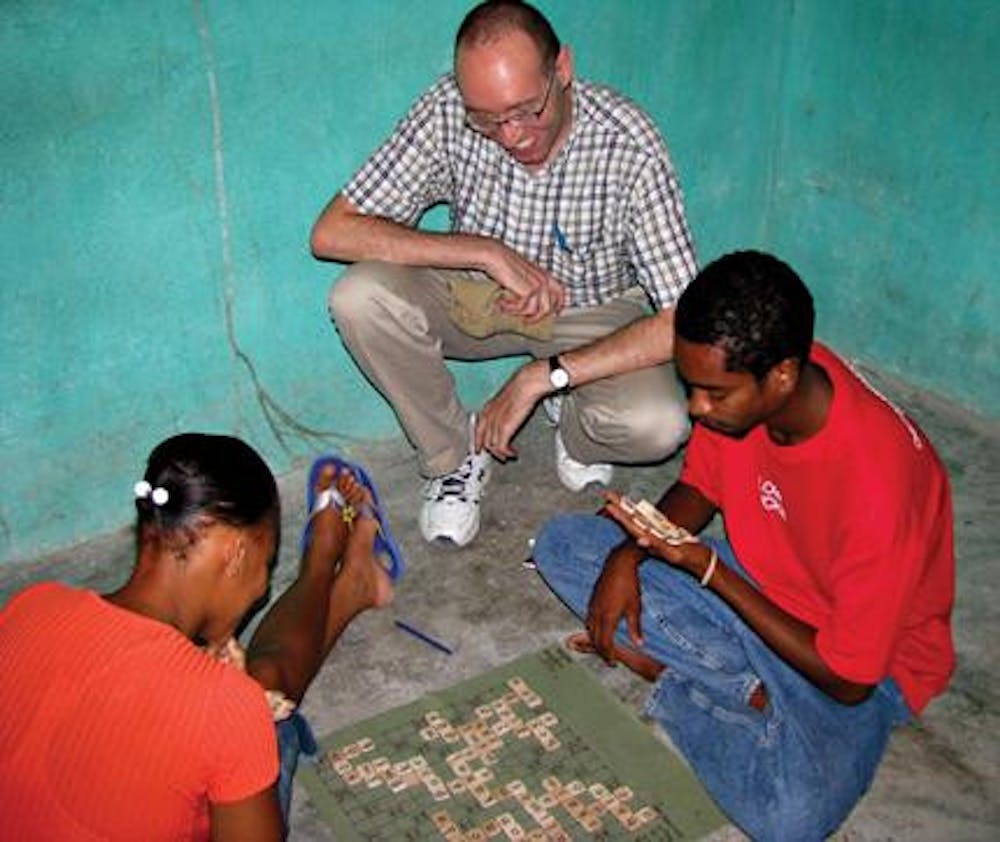Benjamin Hebblethwaite stared at Martin Luther King Jr.'s famous words from his "I Have a Dream" speech displayed on the computer screen.
Hebblethwaite knew exactly what to do as he sat in an Indiana University computer lab in 2003.
The French linguistics graduate student analyzed the words carefully. He needed to find the appropriate translation for each word so the sentences sounded natural.
He studied the words "Free at last, free at last; thank God Almighty, we are free at last," and he finally typed out what he believed was the right phrasing.
"Lib anfen, lib anfen; mèsi Bondye Toupisan, nou lib anfen."
Hebblethwaite was the first person to translate the speech from English to Haitian Creole.
Now a UF professor, Hebblethwaite teaches Haitian Creole to a growing number of students on campus. More than 70 students have registered for the fall semester, which is the largest student enrollment in the U.S., he said.
However, it's still the smallest division in UF's Department of Romance Languages and Literatures with a total of three professors teaching the language, Hebblethwaite said.
He hopes the growing number of Haitians in Florida will be interested in studying their native language and culture, which would allow the program to expand in the future.
"It's understudied, so for students, it's exciting to do something nobody else does," Hebblethwaite said.
While pursuing his master's degree in French literature at Purdue University in 1996, Hebblethwaite started reading the Creole Bible because it was "the only book I could find," he said.
Haitian Creole classes weren't offered, so Hebblethwaite had to teach himself using Creole books. To this day, he has never taken a Haitian Creole language course.
When UF offered him a position as lecturer in late 2003, he jumped at the chance.
"It's a very small [job] field, and there are very few positions to be filled," Hebblethwaite said. "So this was a job I wanted."
In the classroom, his goal is to engage students through open discussions so they can come to understand and appreciate the language he fell in love with almost 13 years ago.
Sherley Jean, a UF alumna, is a Haitian-American who already spoke Creole when she took Hebblethwaite's Intermediate Haitian Creole course. She wanted to learn how to write it.
She said his genuine enthusiasm for what he teaches along with the smile on his face is infectious.
"We talk, so it's not a lecture," Jean said. "And that's something special."
After his June UF-funded trip to the island of Guadeloupe in the eastern Caribbean, Hebblethwaite changed his fall curriculum to include Guadeloupean and Martinican Creole graphic novels as well as reggae, dancehall and hip-hop music.
Just as he engages his students at UF in reading and writing Creole, Hebblethwaite hopes to do the same with the natives of Haiti, a country with one of the lowest literacy rates in the world.
In Haiti, schools teach primarily in French, which Hebblethwaite said is difficult for the students because a clash of "two antagonistic languages" has developed.
"Even though [the U.S.] has one of the top 40 educational systems in the world, it doesn't produce many bilingual students," he said. "Yet people expect one of the poorest countries in the world to produce bilingual students when not even the richest countries can do that."
He has traveled to Haiti five times and has taught Creole reading comprehension and writing in two different Haitian high schools.
Above all, Hebblethwaite understands the power language has to connect people, which is why he holds his translation of Martin Luther King Jr.'s speech in high regard.
"It felt so good when I finished the first draft of that speech," he said. "I felt like it created a link between people."






